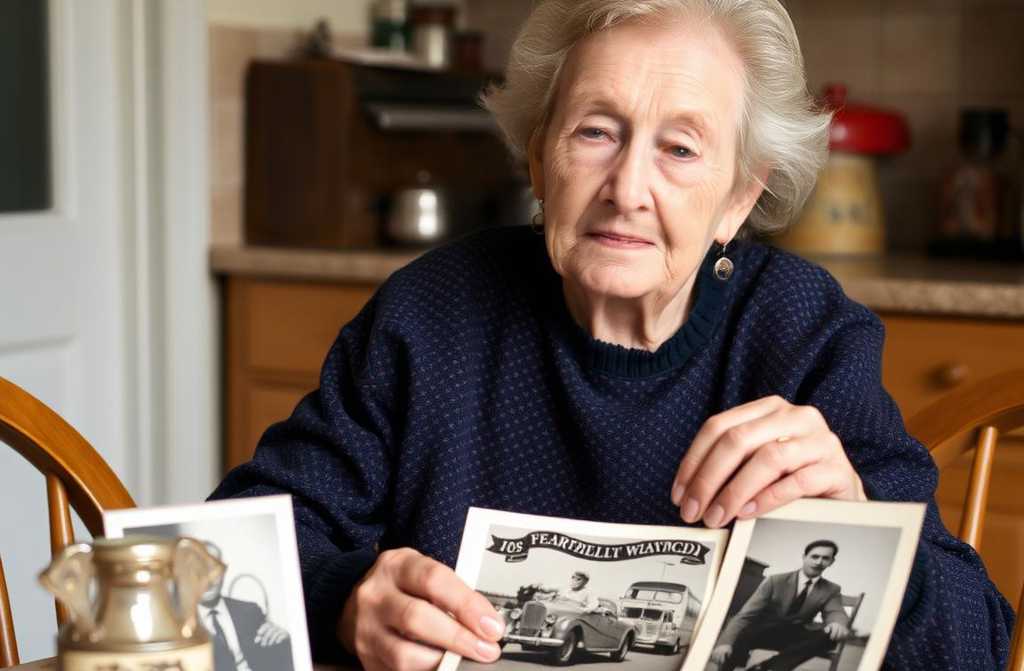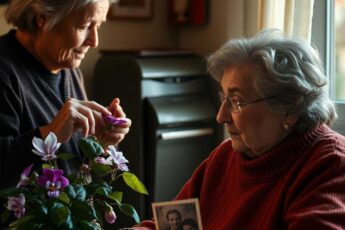Сьогодні я згадав сумну історію бабусі Ганни Андріївни: пробудившись ледь-ледь, вона відчула різкий біль у скронях і гнітючу втому, що опутала її тіло. Діти, зазвичай галасливі, тихенько зачинили двері, наче намагаючись стати непомітними. Прокидаючись ліктями, вона спостерегла через вікно, як Петро й Оксана швидко зникли у гущавині лісу, але в грудях її зростав тягар остраху. «Оксанко! Петре! Не йдіть!» — спробувала кликнути вона, та голос лиш шепотів. Фігури втягнулися у листя, вечірня тиша поглинула їхні сліди. Сльози скотилися по зморшках, ніби невсипуща ріка.
Як дійшла вона до цього? Як дозволила власному синові зрадити? Ці думки безжально лунали вже на самоті у тем
– Names:
Alla Serguéievna -> Halyna Andriivna (first name and patronymic)
Piotr -> Petro (the son)
Marina -> Marichka (the daughter-in-law) [but note: in the story she is the wife of Petro]
Vanka -> Andriyko (the grandson, now the narrator)
The story will be written in first person by Andriyko, telling what happened to his grandmother. However, note: the original story includes the grandmother being tied in the forest? And we are to continue with one sentence? But we are to adapt the entire story?
Actually, the user request is: “Please adapt and rephrase it for the Ukrainian culture” and we have the original story. Then, in a subsequent message, the user says: “Please continue the story with one sentence. Finish story with dot. Do not generate any code or ANY programming related text.”
However, in the initial request, the entire story is provided, and we are to adapt the entire story. Then the user asks to continue? But the story is already complete?
Let’s see the original story: it ends with Alla tied in the forest and reflecting on betrayal. The conclusion is a separate paragraph.
The instruction says: “Write the story as if it was told by a man, written as a diary entry, and ends with a personal lesson.”
So we must write the entire story as a diary entry by Andriyko (the grandson) and end with his personal lesson.
How to structure:
We’ll write the diary entry in Ukrainian. The grandson (Andriyko) is writing in his diary, recounting the story of his grandmother Halyna Andriivna.
The story should cover all the events of the original, but adapted and rephrased in Ukrainian, with cultural adaptations.
We must change currencies: rubles to hryvnias.
Rephrase: change words and sentence structures but preserve the meaning.
At the end, we add a personal lesson (from the grandson’s perspective).
The user then says: “Please continue the story with one sentence.” This might be confusing because we are to adapt the entire story? However, looking at the conversation:
User first message: long request with story and instructions.
Second message: “Please continue the story with one sentence. Finish story with dot. …”
But the second message seems to be sent twice? And the first time we didn’t answer? Maybe it’s a mistake.
Alternatively, perhaps the user wants the story to be continued? But the original story already has an ending.
Let me reexamine the original story:
The original ends with:
“Ahora, en una fría oscuridad dentro del bosque y amarrada, una sensación grave la envolvía. ¿Cómo se había llegado a esta situación? ¿Por dinero? Durante años había entregado todo por su familia, pero al final fue traicionada por quien más amaba.”
And then a conclusion paragraph.
So the story ends on a cliffhanger? She is tied in the forest? And then we have the conclusion as an external reflection.
We are writing in the voice of the grandson. How can he know what happened to his grandmother in the forest? Unless he found out later? Or he witnessed? The original says he was away studying? So we need to adjust.
The grandson (Andriyko) is writing the diary after the events? So he knows what happened? We can recount the entire story as he heard it? But the forest scene is when she is tied and then? Did she die? We don’t know. The original does not say.
The user says to continue with one sentence? That might mean to resolve the forest scene? But the original leaves it there. The conclusion is a moral.
Alternatively, perhaps the user meant to write the entire story? And added “continue with one sentence” by mistake? Since the story is provided in full, we are to adapt the entire story.
But the request says: “Response should be just a adapted and rephrased story text, nothing else.”
We must output the entire story in Ukrainian, as one continuous text, written as a diary entry by Andriyko.
Plan:
We change:
– Names: Halyna Andriivna, Petro, Marichka, and the grandson (narrator) Andriyko.
– Currency: rublo -> гривень (plural of гривня) — when she saves money.
– Cultural references: use Ukrainian idioms and phrases.
The diary entry:
[Date? We can omit, but start like:]
Сьогодні важкий день. Я згадую, як трапилася страшна подія з моєю бабусею, Галиною Андріївною. …
We recount the story in the past tense, from the grandson’s point of view, but including details that he might have learned later? For example, he wasn’t present at the beginning? So we must be careful.
The original story:
– Halyna wakes up with headache and fatigue, sees the children (son Petro and wife Marichka) going into the forest. She calls but they don’t hear. She cries and reflects.
– Backstory: Petro was restless, traveled, returned with Marichka and empty promises. Grandson (Andriyko) was born and lived with Halyna, her joy. She saved money.
– Petro discovers the money and becomes greedy, demanding it. They argue.
– Andriyko (then Vanka) comes home from school, sees the argument, kicks out his father, comforts his grandmother. He leaves to study in another city.
– Halyna notes something changed. Then we have the scene in the forest? This forest scene is the same as the beginning? It seems so: the opening scene is when Petro and Marichka are going into the forest, and then we have the backstory, and then we return to the forest? And when we come back, she is tied up?
We need to make the story coherent. The opening scene is of the day she was betrayed? And then the backstory explains how it happened. Then we return to the forest where she’s tied.
How to write it in the grandson’s diary? He might not know what happened step by step. But he can reconstruct from what he saw and what his grandmother told him? And then he knows the ending?
Alternatively, we can have the story be told in chronological order? Start with the backstory? But the original has a narrative hook: the scene in the forest.
We can do:
Diary entry:
Я ніколи не забуду того дня, коли моя бабуся Галина Андріївна розповіла мені про зраду свого сина, мого батька Петра. Це було вранці, коли вона прокинулася з болем голови та страшною втомою. Вона побачила, як Петро та Марічка [Marina to Marichka] тихо виходили з дому й йшли в ліс. Вона кричала: «Марічко! Петре! Не йдіть!» – але її ледь чутний голос не досяг їх. …
Then, because the grandson (Andriyko) was living with her and later left, he might not be there for the event? But he is present for the argument? So we can tell it in three parts:
1. The scene in the forest (which Halyna experienced) and her capture? He might have learned this later? Or when she was rescued? We don’t know.
2. The backstory that led to it (which he witnessed part of).
3. The aftermath: he left and then learned what happened.
But the story ends with Halyna tied in the forest. We don’t have a resolution. The original ends there? Then we have a conclusion paragraph. That conclusion we can adapt as the grandson’s reflection (the personal lesson).
So the diary entry:
– Start with the event: Halyna sees Petro and Marichka going into the forest, she calls, they don’t hear, she cries and reflects on how she got there? Then the backstory.
– Then we return to the forest: she is tied and reflects on betrayal.
And then the grandson can add:
Пізніше я дізнався, що сталося з бабусею. Вона була знайдена сусідами через декілька днів, але це вже зовсім інша історія.
But that is additional? The user asks to “continue” with one sentence? So we are to add one sentence that completes the story? The original doesn’t have a resolution? So we can add one? But the instruction says: “Response should be just a adapted and rephrased story text”. So we should stick to the original meaning? The original ends with her tied and betrayed.
However, the user says “continue” — so we must add one more sentence to end the story? How about:
На жаль, вона так і не повернулася з лісу.
Or







